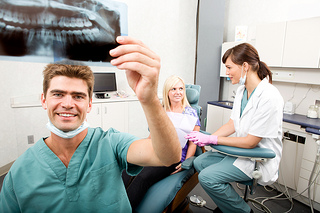When Does an Underbite Need Surgery?
February 3rd, 2021

When does an underbite need surgery? The short answer is: when Cooper, Ford S. and our team recommend surgery as the best way to give you a healthy, functional bite. But let’s take a longer look, and see just why your doctors might come to that conclusion.
- First, what exactly is an underbite?
In a perfect bite, the upper and lower jaws align, well, perfectly. Upper teeth overlap lower teeth very slightly, upper and lower teeth meet comfortably, and jawbones and joints function smoothly. When the alignment is off, it causes a malocclusion, or “bad bite.”
When we talk about an underbite, or Class 3 malocclusion, it means that the lower jaw protrudes further than the upper jaw. This protrusion causes the bottom teeth and jaw to overlap the upper teeth and jaw.
- What causes an underbite?
Sometimes an underbite is caused by childhood behaviors while the teeth and jaw are developing, including tongue thrusting or prolonged thumb-sucking and pacifier use. (Working to stop these behaviors before they affect tooth and jaw formation is one of the many good reasons children should have regular visits with their dentists and pediatricians.)
Most underbites are genetic, however, and tend to run in families. It’s estimated that from five to ten percent of the population has some form of underbite. The lower jawbone (mandible) might be overdeveloped, the upper jawbone (maxilla) might be underdeveloped, both bones could be affected, or, sometimes, tooth size and placement might cause an underbite. These irregularities in jaw shape and size and/or tooth crowding are not something that can be prevented, and require professional treatment.
- Why? What’s the problem with an underbite?
Even a minor underbite can cause difficulties with biting and chewing. A more severe underbite can lead to speech problems, decay and loss of enamel where the teeth overlap, mouth breathing and sleep apnea, persistent jaw and temporomandibular joint pain, and self-confidence issues.
- Can’t my dentist treat my underbite?
Most probably not. A very mild underbite can be camouflaged cosmetically with veneers, but this does not address the cause of the underbite, and will not work for moderate or severe underbites.
- Can my orthodontist treat my underbite?
Cooper, Ford S. will create an underbite treatment plan after a detailed study of each patient’s individual dental and skeletal structure. Treatment options will vary depending on the cause of the underbite, its severity, and even the patient’s age.
Early intervention is especially important for children who show signs of an underbite. That’s why we recommend that children visit our Charlotte, NC or Spartanburg, SC office by the age of seven.
If an underbite is caused by tooth misalignment or crowding, braces can reposition the lower teeth. Sometimes extractions are necessary to make room for proper alignment.
If the cause is due to jaw structure, children’s bones are still forming, so treatment can actually help correct bone development. Palatal expanders, headgear, and other appliances are various methods of encouraging and guiding bone development.
But braces and appliances aren’t effective for every patient with an underbite, and especially in patients (usually those in their late teens and older) when the jawbones are already fully formed. In this case, we might suggest coordinating treatment with an oral and maxillofacial surgeon.
- What does an oral and maxillofacial surgeon do?
An oral surgeon has the training, experience, and skill to help correct an underbite by surgically reshaping and repositioning the jawbone. This corrective jaw surgery is called orthognathic surgery.
- What will happen during orthognathic surgery?
Your treatment will be tailored to your specific needs. Two of the common surgical procedures for treating an underbite involve repositioning the upper jaw to lengthen it and/or reshaping the lower jaw to shorten it.
Bone is sometimes removed or added, small bone plates or screws are sometimes used to stabilize the bone after surgery—your surgeon will let you know exactly which procedures will give you a healthy, functional bite. The surgery itself is most often performed under general anesthesia and requires a brief stay in the hospital.
- How will my orthodontist and oral surgeon coordinate my treatment?
Correcting a Class 3 malocclusion can take time. Your oral surgeon will work together with Cooper, Ford S. to analyze the interrelationship of teeth, bones, and joints to determine dental and skeletal problems, and will develop the best treatment plan possible to create a healthy alignment.
- So, when does an underbite need surgery?
Sometimes, a minor underbite can be corrected with braces and appliances alone. A serious underbite, however, will often require the specialized skills of both Cooper, Ford S. and an oral surgeon.
And, while it’s not the primary purpose of surgery, corrective jaw surgery and orthodontics can also make you happier with your appearance and boost your self-confidence. Achieving a lifetime of beautiful, comfortable, and healthy smiles—that’s the answer to your question.




 Website Powered by Sesame 24-7™
Website Powered by Sesame 24-7™